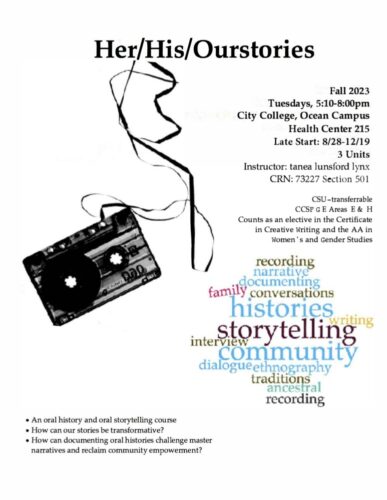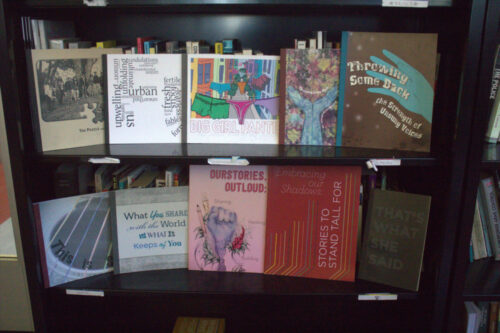Women’s and Gender Studies Oral Storytelling Class Returns After 4 Year Hiatus
By Imani C. Davis
Her/His/Ourstories, WGST 20, is being revived from a several year hiatus this Fall 2023 semester. The “Oral History and Oral Storytelling” class will be taught by Women’s and Gender Studies Professor tanea lunsford lynx. The 3-unit course is Tuesdays, 5:10-8:00 p.m. on Ocean Campus in Health Center 215.
The course was originally developed by Dr. Jean Ishibashi, former professor of both Women’s and Gender Studies and Interdisciplinary Studies at City College. Dr. Ishibashi developed and taught the class with a certain pedagogy that left a lasting effect on many of her students.

Formerly known as WOMN 20, the course seeks to teach “strategies for researching individual and community stories to enhance life and career/job choices while emphasizing female oral storytelling traditions.” Professor lunsford lynx elaborated on the twofold structure of the class: “telling the story about stories, and the element of actually learning how to tell a good story, what makes stories dynamic through craft, voice and study.” Professor lunsford lynx explains, “there’s a deep history that has to do with feminism and stories to begin with that we’re uncovering– undertold stories and erased stories, especially.”
When asked if the class is for “everyone,” lunsford lynx was passionate in her response, that yes, the class is absolutely for everyone who wants to learn about the histories of stories and how to tell them.“When we think about feminism and stories, when we think about social justice and ethnic studies and stories, these are for everyone to have more stories, more of the time. Representing more people is the form of justice that we’re focusing on in the course.”
She points out the fact that for some, this may be a first or rare time hearing stories from certain communities. “Storytelling practices within our Indigenous communities, Black and African American communities, etc, weren’t seen as valid, weren’t seen as rigorous. And so to be in this course and to have that focus, and for folks to see their history, [that] the lineage is represented and know how rigorous it is, and how much it’s been established as an art form before, so so so many years ago is a really beautiful opportunity. It can be transformative for folks.”
Focusing on ‘oral’ histories, in the age of technology, lunsford lynx plans to have the class explore several techniques to transmit these oral stories students write in the class. “There’s a practical element where folks will get to practice writing, recording and visual storytelling”; she elaborated that she wants students to expand to mediums beyond writing, and take advantage of the readily available technology by “learning how to work with what we have available to us to tell stories.”
By the end of the semester students are provided with the opportunity to publish the work they have accomplished throughout the semester. A former student in the Her/His/Ourstories class, and current International and Multicultural Education doctoral student Edian Schofield reflected on his time working on the publication: “The content varied from different topics from stories about resistance, about immigration, to stories about reclaiming power, from violence against women, from reclaiming their voice and kind of healing through the journey.” He explained the process as a collaboration where the students act as both researchers and artists, drawing on their life experience as evidence. Produced like a research journal, the entries included a plethora of art mediums, and the stories were centered as informative and referenceable as research.
Considering the class has been off of the class schedule for more than four years, last offered Spring of 2019, lunsford lynx explained why the class is being offered once again. “I think right now, there are so many news stories that are being told, when I think about visual storytelling and films, about podcasts and recording, plays and books, and all of these things, there’s a wealth of new material that we have at our fingertips accessible to us.”

Rose Letulle, a former student of the Women’s and Gender Studies department, wrote an email to Dr. Ishibashi where she gave permission to the department to share her experience with “anyone and all” in hopes of reviving the course. “Six or so years ago I took His/Her Our Stories with you. That class, the people in it, the stories told, and you, have been one of the most powerful pieces of my time at city college [sic] and one of the most powerful moments of learning in my life. I can still feel those stories and the connections we made with one another.”
Students have until September 19th to petition to add the course with a Late Add Petition.
Students are welcome to begin to attend the class and send a Late Add Petition to lunsford lynx by September 19th to add this course to their Fall 2023 semester experience. To reach out about the class, students can email her at tlunsford@ccsf.edu.
Information to Add on Her/His/Ourstories
WGST 20: Her/His/Ourstories
CRN:73227
Section 501
Class Dates: 8/28-12/19
